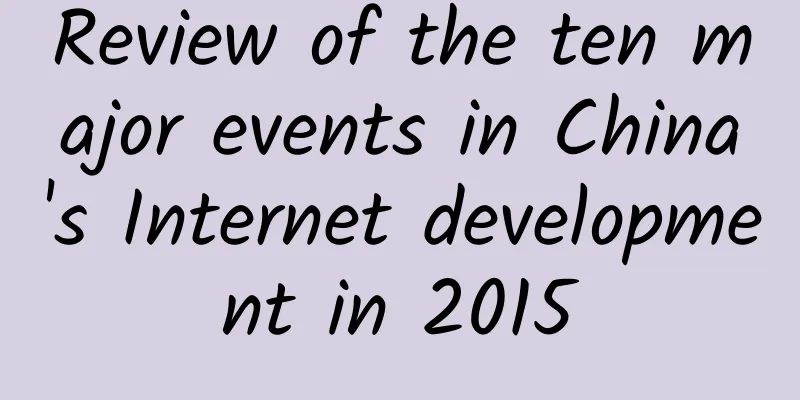Review of the ten major events in China's Internet development in 2015

|
Looking back at 2015, "Internet Plus", "speed up and reduce fees", "Wuzhen Summit" and other buzzwords have become well-known to the majority of netizens, and these buzzwords also outline the development path of China's Internet in this year. In the past year, the Internet has developed comprehensively and has become an indispensable part of my country's infrastructure construction, economic transformation, social development, technological progress, international exchanges and even national governance. The following 10 major events may help lead everyone to relive the exciting moments in the development of my country's Internet this year. China with “Internet+”: A review of ten major events in China’s Internet development in 2015 @“Internet+” Action Plan "Internet +" is not only a technological change, but also a change in thinking. "+" is not a simple addition of two things, but the use of information and communication technology and the Internet platform to allow the Internet and traditional industries to conduct in-depth cross-border integration and create a new development ecology. In March 2015, "Internet Plus" was written into the Government Work Report, becoming a major national initiative in my country. It is of great significance for accelerating institutional reforms, implementing the innovation-driven strategy, and creating the "dual engines" of mass entrepreneurship and innovation and increasing public products and public services. In July 2015, the State Council issued the "Guiding Opinions on Actively Promoting the 'Internet Plus' Action Plan", which clearly pointed out that 11 key action areas such as "Internet Plus" innovation and entrepreneurship, collaborative manufacturing, modern agriculture, and e-commerce will be the development direction. In October 2015, the Fifth Plenary Session of the 18th CPC Central Committee reviewed and approved the "13th Five-Year Plan", which clearly proposed implementing the strategy of building a cyber power, implementing the "Internet Plus" action plan, developing the sharing economy, and implementing the national big data strategy. The comprehensive promotion of the "Internet Plus" action plan will promote the comprehensive connection and integrated development of informatization with agriculture, industry and services, the booming sharing economy, help traditional industries improve their development quality and efficiency, and promote economic transformation and upgrading. @The first Internet bank was born On January 4, 2015, Premier Li Keqiang visited Shenzhen Qianhai Weizhong Bank, one of the first batch of private banks in China, and witnessed the first business. During the inspection, he stressed that Internet finance must develop moderately. "The government should create a good development environment for Internet finance companies, so that you have a 'comfort' and are no longer tied up. At the same time, you must also have a 'firewall' to prevent and control risks." On January 18, Shenzhen Qianhai WeBank started trial operation with a registered capital of 3 billion yuan. Its business scope includes accepting deposits from the public, mainly individuals and small and micro enterprises; issuing short-term, medium-term and long-term loans mainly to individuals and small and micro enterprises; handling domestic and foreign settlements as well as bills, bonds, foreign exchange, bank cards and other businesses. Compared with traditional banks, WeBank has innovated its financial business model and financial transaction methods, which is a subversion of the original outlets and counter business. Its positioning is a bank that "has neither business outlets nor business counters, and does not require property guarantees, but issues loans through facial recognition technology and big data credit rating." Industry insiders believe that with the establishment of Internet banks such as WeBank, in order to comply with new regulatory requirements, the construction of financial infrastructure including online identity recognition and credit reporting will achieve a new leap forward. @Robot Conference On November 23, 2015, the 2015 World Robot Conference with the theme of "Cooperation, Integration and Win-win, Leading the Intelligent Society" opened in Beijing. 12 international robot organizations and 58 domestic research institutions participated in the conference. More than 100 experts and scholars from more than 10 countries and Hong Kong, Macao and Taiwan participated in the keynote report meeting and special forum. More than 100 domestic and foreign companies participated in the Robot Expo to showcase leading robot products. 145 youth teams from 16 countries and regions participated in the two-day World Youth Robot Invitational Competition. In his congratulatory letter, Chinese President Xi Jinping said that with the continuous integration of informatization and industrialization, the intelligent industry represented by robotics technology has flourished and become an important symbol of scientific and technological innovation in the current era. China has included robots and intelligent manufacturing in the priority areas of national scientific and technological innovation. As the jewel in the crown of the manufacturing industry, robots are an important indicator of a country's manufacturing development level and are also deeply influenced by the development of information technology and the Internet. Now, robots are not only used in the manufacturing industry, but also in many fields such as medical care, elderly care, and home services, becoming one of the fastest-growing industries in my country. At present, there are at least 40 cities in the country that focus on the layout of the robot industry in industrial parks. The great era of the development of my country's robot industry is coming. @Internet giants "grouping" If the Internet industry in 2014 was still a battlefield filled with smoke of gunpowder, then "marriage" brought a touch of seemingly warm color to the Internet circle in 2015. Since the beginning of this year, merger news has been revealed in Internet sub-sectors such as travel, local life, and OTA (online travel). The original price war was prevalent, and the smoke of "life and death" suddenly dissipated, replaced by the Internet "new small giants" that the audience talked about with relish. On February 14, 2015, Didi and Kuaidi jointly announced that they would formally merge by exchanging 100% of their shares. After the merger, the personnel structure of the two companies remained unchanged and their businesses continued to develop in parallel. This merger became the largest merger of unlisted companies in the history of China's Internet industry. Since the merger of Didi and Kuaidi, mergers in the Internet industry have been "unstoppable". 58.com and Ganji, Meituan and Dianping, Ctrip and Qunar, these competitors who used to be "incompatible" have all chosen to "marry". Just on December 7, Jiayuan.com and Baihe.com also chose to "get together". Analysis points out that the main reason for these mergers is driven by capital. Behind the above-mentioned "marriages", there are basically the three major Internet giants BAT (Baidu, Alibaba, Tencent). @Wuzhen World Internet Conference The Second World Internet Conference was held in Wuzhen, Zhejiang from December 16 to 18, 2015, with the theme of "Connectivity, Sharing and Governance - Building a Community of Shared Future in Cyberspace". More than 2,000 guests, including government representatives, heads of international organizations, Internet company leaders, experts and scholars from more than 120 countries and regions on five continents, attended the conference. Chinese President Xi Jinping attended the opening ceremony and delivered a keynote speech. In his speech, President Xi Jinping proposed the "four principles" for promoting the reform of the global Internet governance system and put forward the "five proposals" for jointly building a community with a shared future in cyberspace. This speech quickly sparked heated discussions. Experts and scholars said that President Xi Jinping's speech directly addressed the common problems of the development of the world's Internet, comprehensively expounded China's basic position on the development and security of cyberspace, demonstrated China's forward-looking thinking on the future development of cyberspace, and became the "Chinese solution" for building a community with a shared future in cyberspace. At the second World Internet Conference, the "Light of Internet" Expo also kicked off. Many new Internet technologies, products, and applications, such as Baidu's driverless cars, China Telecom's 5G technology, and the Beidou satellite navigation and positioning system, made their debut at the conference venue. @Speed up and reduce fees The State Council executive meeting held on May 13, 2015 proposed that accelerating the construction of high-speed broadband networks and promoting speed increases and fee reductions can not only improve people's lives, but also reduce the cost of entrepreneurship and innovation, provide strong support for the "Internet +" action, stimulate effective investment and consumption, and cultivate new development momentum. Subsequently, the General Office of the State Council issued the Guiding Opinions on Accelerating the Construction of High-speed Broadband Networks and Promoting Network Speed Increase and Fee Reduction (hereinafter referred to as the Guiding Opinions). The Guiding Opinions pointed out that infrastructure construction should be accelerated to significantly increase network speed. By the end of 2015, more than 80% of households in urban areas of prefecture-level cities and some non-prefecture-level cities with conditions will have 100Mbps (megabits per second) fiber access capabilities, and more than 50% of prefecture-level cities will achieve full fiber network coverage. The Guiding Opinions also made it clear that competition would be used to promote the improvement of broadband service quality and further reduce service charges, and the "Information for the People" project would be further promoted based on broadband network infrastructure. Subsequently, the three major operators took action one after another: China Unicom promised to reduce the overall unit price of data traffic for all mobile users by more than 20% by the end of 2016; China Telecom announced a free speed increase for broadband below 4M, and a 40% reduction in traffic charges; China Mobile also said it would launch 12 new measures to increase speed and reduce charges. In addition, the three major operators have implemented a "no clearing of traffic in the current month" policy for all users this year. @Double Eleven craze On November 11, 2015, just after the clock struck midnight, 1 minute and 12 seconds had passed, the transaction volume of Tmall's "Double Eleven" 2015 exceeded 1 billion yuan; 5 minutes and 45 seconds later, the transaction volume exceeded 5 billion yuan; 12 minutes and 28 seconds after the opening, the transaction volume had reached 10 billion. At 24:00 on November 12, the seventh Tmall "Double Eleven" Global Carnival came to an end, with a total transaction volume of 91.217 billion yuan, of which wireless transaction volume was 62.642 billion yuan, accounting for 68.67%. The cumulative logistics orders on that day exceeded 468 million pieces, and 232 countries and regions participated in the transaction. From 52 million yuan in 2009 to the huge figures today, "Double Eleven" has spread from Tmall to all e-commerce platforms, from China to the world. November 11 is gradually changing from a single e-commerce marketing day to a shopping carnival for global consumers, and this expansion has led to a huge change in China's entire e-commerce. According to statistics, the total online retail sales in China reached 2.95 trillion yuan in the first 10 months of 2015. Industry insiders pointed out that the significance of Tmall's "Double Eleven" transaction volume has far exceeded shopping itself, and it also reveals the confidence and changes that "Internet +" represented by e-commerce has brought to China's economy. @BAT Internet Map Since the beginning of this year, the three giants BAT have continued to seize market share. Baidu has formed two major modules in O2O this year: one is the medium and high frequency O2O built with Baidu Nuomi, maps, mobile assistant, etc. as the core. Ctrip, Qunar, Uber, COFCO Womai.com, MiYa, e袋洗, etc., which are deployed by Baidu, have become its service providers; the other is the product mainly based on Baidu Direct Express, which covers the offline long-tail and low-frequency consumption local life services. After Baidu built the O2O consumption scenario, it began to formally lay out Internet finance. In November this year, Baidu and CITIC Bank established "Baidu Bank", and then jointly established "Baidu Insurance" with Allianz Group and Hillhouse Capital, and both stated that they would launch Internet financial products in combination with O2O. Since the beginning of this year, Alibaba has invested in Suning Commerce Group, YTO Express, Indian online payment platform Paytm, US online retailer Jet.com and US maternal and infant e-commerce company Zulily, all of which are aimed at improving the service system of its e-commerce business and deepening its capabilities in vertical e-commerce and cross-border e-commerce. This year, Alibaba's two most eye-catching capital operations were its investment in Suning Commerce Group and its $4.5 billion acquisition of Youku Tudou. In addition, since Alibaba acquired Hong Kong-listed China Culture Media in 2014 and renamed it Alibaba Pictures, it has gradually invested in Wasu Films, Huayi Brothers, Enlight Media, and China Business Network, etc., showing the full scope of Alibaba's cultural empire. In September this year, Tencent also announced the establishment of two film and television companies: Tencent Pictures and Penguin Pictures, which are respectively affiliated to Tencent IEG (Interactive Entertainment Group) and Tencent OMG (Online Media Group). @Startup Coffee Zhongguancun Startup Street, which has been open for a year and a half, has been hailed by entrepreneurs as a "landmark of Internet entrepreneurship". Many people even come here just to drink a cup of "Prime Minister Coffee". The latest data shows that among the more than 30,000 square meters of space in the district, there are more than 40 professional entrepreneurial service institutions. In 2015 alone, more than 2,200 investment institutions settled in the district, and a total of 1,791 entrepreneurial teams were incubated in the Entrepreneurship Street, with an average of 4.9 incubated per day. Nearly 400 entrepreneurial companies received financing, with a total amount of about 2 billion yuan, and many young people came here to attract them. In 2015, "mass entrepreneurship and innovation" was written into the "Government Work Report" for the first time, which also brought about a nationwide wave of entrepreneurship and innovation. The General Office of the State Council issued the "Guiding Opinions on Developing Mass Innovation Spaces to Promote Mass Innovation and Entrepreneurship", deploying and promoting mass entrepreneurship and innovation, and promoting a large number of low-cost, convenient, full-factor, and open mass innovation spaces. The State Council executive meeting held on June 4th once again decided to launch a series of tax support, housing concessions and other measures around "mass entrepreneurship and innovation". In subsequent State Council executive meetings, "mass entrepreneurship and innovation" became a high-frequency word, and the number of related measures issued was also considerable. Some people say that this is the first year of China's "mass entrepreneurship and innovation". As the entrepreneurial atmosphere continues to grow, both elites and grassroots can devote themselves to entrepreneurship and innovation and gallop in a vast space; crowd innovation, crowd sourcing, crowd support and crowd funding continue to emerge, and the production method has undergone profound changes; in addition, innovation is no longer just the patent of small and micro enterprises, and large enterprises are also actively embracing "mass entrepreneurship and innovation", traditional industries are being transformed and upgraded, and modern service industries are accelerating their rise, working together to create a new engine for China's economy. In addition, it is worth noting that new technologies represented by mobile Internet continue to drive the interactive integration of online and offline (O2O). The product types and service forms based on the O2O model in service industries such as tourism, car rental, and catering delivery are becoming increasingly rich. O2O has become the most active area for mass entrepreneurship and innovation. @IP New Interpretation IP stands for intellectual property. In 2015, this term became a well-deserved buzzword. At present, China's film and television industry IP mainly refers to literary novels, especially online literary novels. In recent years, with the success of film and television works adapted from online novels such as "Love Is Not Blind" and "The Legend of Zhen Huan" in the market, the creation of IP film and television dramas has become unstoppable, and influential works such as "Silent Separation", "Left Ear", "Everything Grows", "Grave Robbers' Chronicles", "Nirvana in Fire", and "So Young" have appeared. The sale of IP copyrights is becoming more and more prosperous, and the purchase price is growing exponentially, and some even exceed the sky-high price of 20 million yuan. These popular TV series have pushed IP development to the peak. Based on the success of the above TV series, IP developers have begun to search for online literature IPs tirelessly. In this regard, many industry insiders remind that the entire cultural and creative industry, including the entire pan-entertainment industry, has entered a stage of industry integration. As an IP developer, you need a set of "combination punches" for IP development channels. Not only that, you must also take the entire industry chain as a starting point and look at the overall situation to better demonstrate the value of IP development. |
<<: 13 Wearable Technology Trends to Watch in 2016
>>: Cut the meat! Who did the big companies get rid of in 2015?
Recommend
How does the box with "eggs" taste? UT egg box experience
Faced with the "bulge" of boxes on the ...
[Highly recommended] Four online tracking services to help you identify application anomalies
【51CTO.com Quick Translation】As we all know, soft...
iOS Native and JavaScript Interaction
When it comes to the interaction between Native a...
What kind of meat is in the beef balls that cost 9.9 yuan per pound?
Audit expert: Wang Guoyi Postdoctoral fellow in N...
How to monetize TikTok?
Recently, Tik Tok has become a battleground for M...
Are the white spots on the nails really due to calcium deficiency? The nails that really need to be worried are like this...
Rumor: "White spots on the nails mean calciu...
App Store revenue distribution is extremely uneven, but independent developers still have opportunities
[[126615]] Recently, Marco Arment, a well-known i...
Summary of essential tools for new media operations and promotion! (superior)
If you want to do your work well, you must first ...
Ember: A review of global electricity in 2022
Ember, an independent think tank on energy and en...
How to build a community of 700,000+ from scratch?
The author of this article tries to combine the p...
How difficult is it to succeed in domestic smart hardware startups?
If last year everyone was still discussing whethe...
Huajie Information: How to do keyword ranking for corporate website promotion?
Now many companies' website rankings are not ...
Game manufacturers say that N cards do not support DX12 asynchronous computing!
[PConline News] Since the official release of Win...
The Earth "remembers" each of our names
From the perspective of the universe, the earth r...









